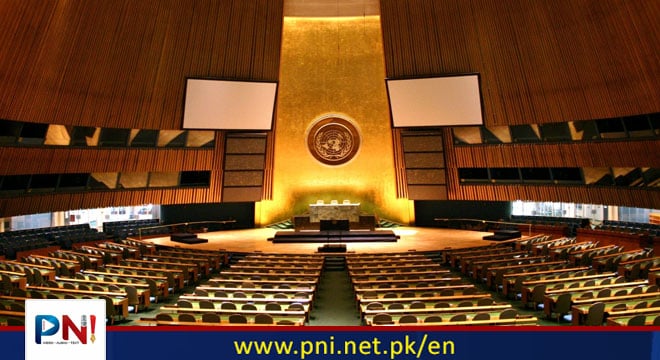UNITED NATIONS, Jul 11 (APP): The United Nations General Assembly on Wednesday dedicated a decade, from 2025 to 2034, to combating increasing sand and dust storms—extreme weather conditions that pose serious environmental, economic, and human risks.
Acting by consensus, the 193-member Assembly adopted the draft resolution titled “United Nations Decade on Combating Sand and Dust Storms (2025-2034)” thus dedicating the 10-year period to the fight against those meteorological phenomena.
By other terms of the text, the Assembly invited the UN Secretary-General to take appropriate steps to plan and organize the activities of the Decade at the global, regional and country levels.
It also stressed that the cost of all activities that may arise from implementation of the resolution should be met from voluntary contributions, including from the private sector.
Uganda’s U.N. Ambassador Godfrey Kwoba, who introduced the resolution on behalf of the Group of 77 (developing countries), told the Assembly the initiative aims to “halt and mitigate the negative effects of sand and dust storms ” through “international and regional cooperation.”
Presiding over the session was the General Assembly President, Dennis Francis.
In a 2022 report, the United Nations Convention to Combat Desertification said sand and dust storms have “increased dramatically in frequency in recent years.”
It said storms can exacerbate respiratory illnesses, kill crops and livestock, and increase desertification, though documentation of their impact is limited.
The convention estimated that 2 trillion tons of sand and dust enter the atmosphere annually, largely in dry lands and sub-humid regions with little vegetation.
The majority of emissions result from natural conditions, but droughts and climate change exacerbate the issue, it said.
The report estimated that “at least 25% of global dust emissions originate from human activities” like unsustainable land management and water use.
As part of the decade-long initiative adopted Wednesday, the General Assembly said the U.N. Food and Agriculture Organization will promote mitigation practices in affected countries, including “sustainable land use management, agroforestry, shelter belts, afforestation/reforestation and land restoration programs.”
The resolution also calls for global cooperation to enhance early warning systems and share weather information important to forecasting sand dust storms.
Follow the PNI Facebook page for the latest news and updates.









